#VETSVolunteerVoices aims to bring you the stories of our passionate VETS program volunteers from the field! In their own words, volunteers reflect on their work, challenges, and personal growth that they experienced during their placements. This story was contributed by K. Calahan, a Communications Volunteer with our VETS program in Kenya in February 2024. Learn more about VETS and the important work being carried out by Canadian volunteers and local partners in Cambodia, Ghana, Kenya, Laos, Senegal, and Vietnam.
Nestled high in the lush hills of Kenya’s Meru County lies the small-scale dairy farm of Beth Naito. Beth, the proud owner of two Holstein Friesian cows, has been dairy farming for 7 years. Today, she is hailed as a “Community One Health Champion” by the Meru Dairy Co-operative and her cows are producing between 18-20 litres of milk per day, more than doubling their previous output. Beth's journey to champion began when she participated in training through VETS, a program dedicated to empowering farmers like her with essential knowledge and skills in livestock health, welfare, and productivity.
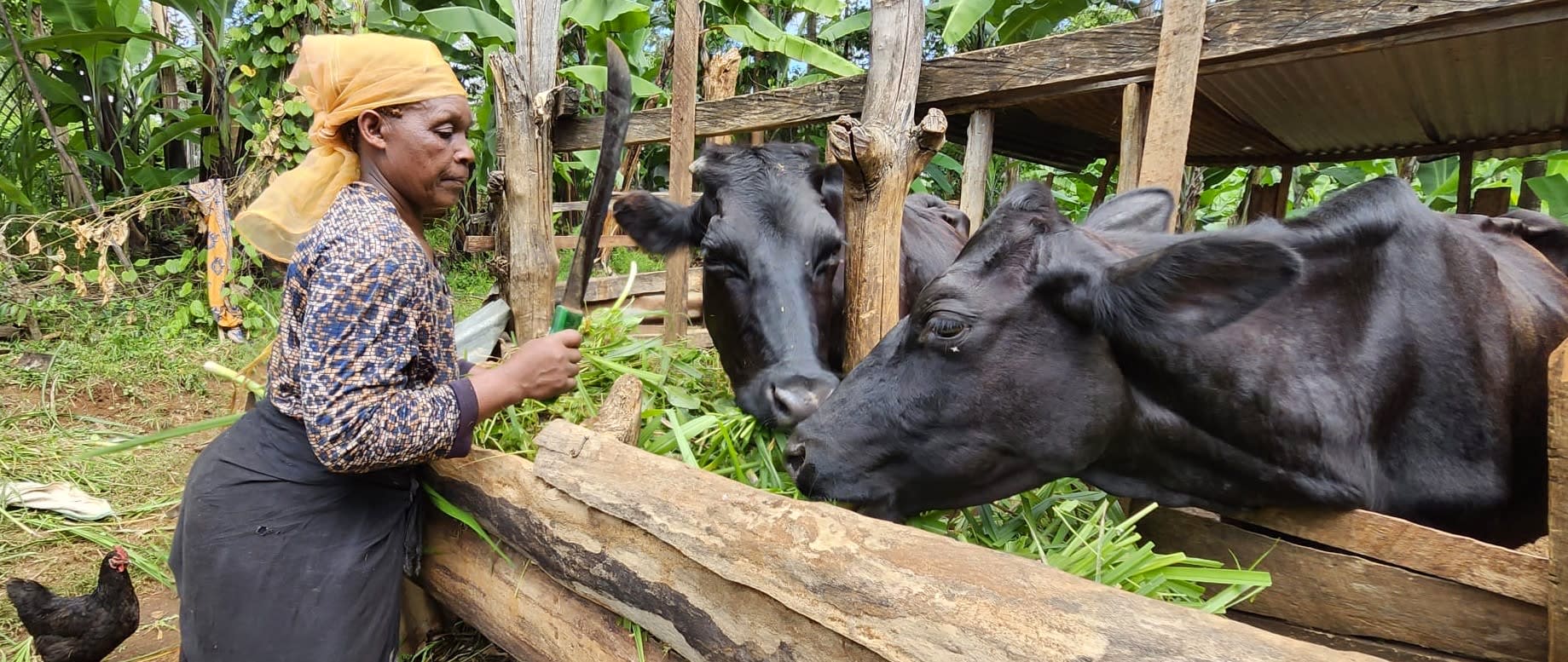
PHOTO: Beth Naito cuts and feeds napier grass (a high-yielding fodder crop) to her dairy cows at her Meru County farm.
"I really learned a lot about nutrition, how to feed the cow, how to breed, and cleanliness," says Beth, reflecting on her training experience. Despite some initial challenges, Beth persevered, gradually implementing her newfound knowledge. Through VETS, she discovered the benefits of incorporating different types of grasses, like panicum, into her cows' diets. These fast-growing grasses are more nutritious, containing higher protein levels compared to other forage options.
Veterinarians Without Borders (VWB) has been sending volunteers to Kenya since 2020 as part of its VETS program. Working in various capacities, VETS volunteers collaborate with local farmers and dairy societies, educating them on cow comfort, hygiene, and proper feeding practices. Despite Kenya having the highest per capita milk consumption in sub-Saharan Africa, its dairy cows are underproducing. According to Hellen Gatwiri, Milk Grading and Field Manager at Meru Dairy Co-operative, a recent survey in Meru County revealed that up to 5% of collected milk was substandard, watery, and lacking adequate fat content likely due to poor nutrition. The fact is, production of milk throughout Kenya is largely through smallholder dairy farmers with a few cows, and many of these farmers lack sufficient knowledge about cow care and nutrition, resulting in low output.
Canadian veterinarians like Dr. Rae-Leigh Pederzolli and Dr. Jaimee Gardner are at the forefront of addressing these challenges. During their VETS volunteer placements earlier this year, they visited multiple dairy farms each day, counseling farmers on best practices. "The farmers here have been very receptive to some of the ideas we have brought," shares Rae-Leigh. "Our farm visits make all our recommendations come to life. Being able to know a farm lets us show where it can individually change and grow."
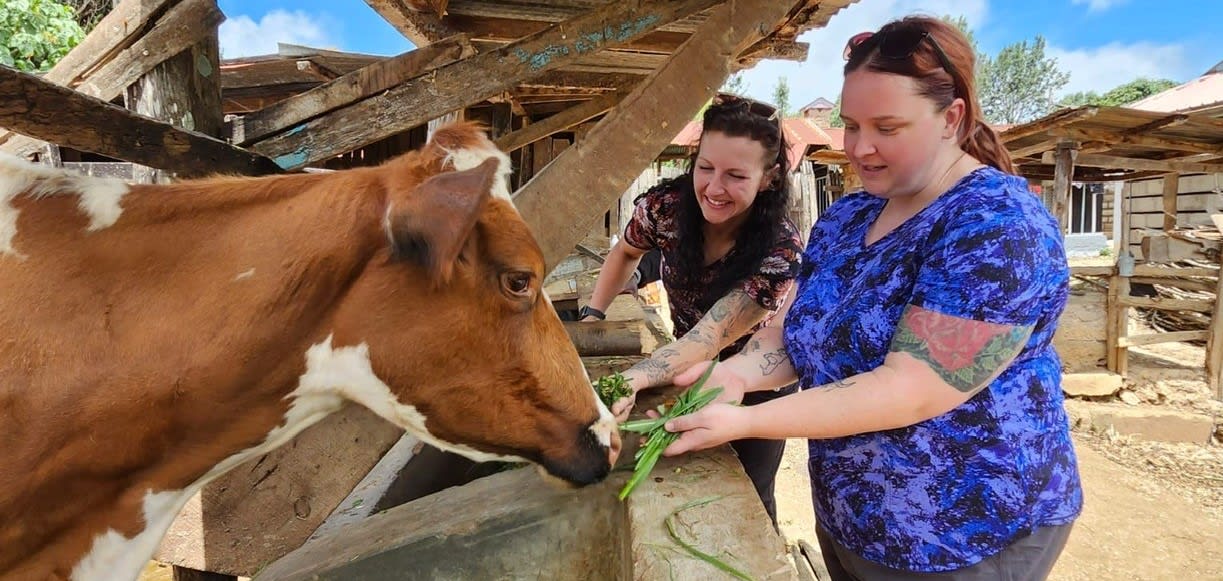
PHOTO: Canadian veterinarians and VETS volunteers, Dr. Rae-Leigh Pederzolli (center) and Dr. Jaimee Gardner (right) at a dairy farm in Kenya.
For example, working cow-side, the two veterinarians demonstrated the use of the California Mastitis Test (CMT) to dairy farmers like Beth. CMT is a simple, inexpensive diagnostic tool that screens for high Somatic Cell Counts (indicative of mastitis) in milk samples. Mastitis, an inflammation of the mammary gland in cows, is the most common disease in dairy cattle, so managing it is a major key to dairy farm productivity. The disease can be costly for farmers due to decreased milk production and milk that is of poor quality. It can also be potentially fatal for the cow.
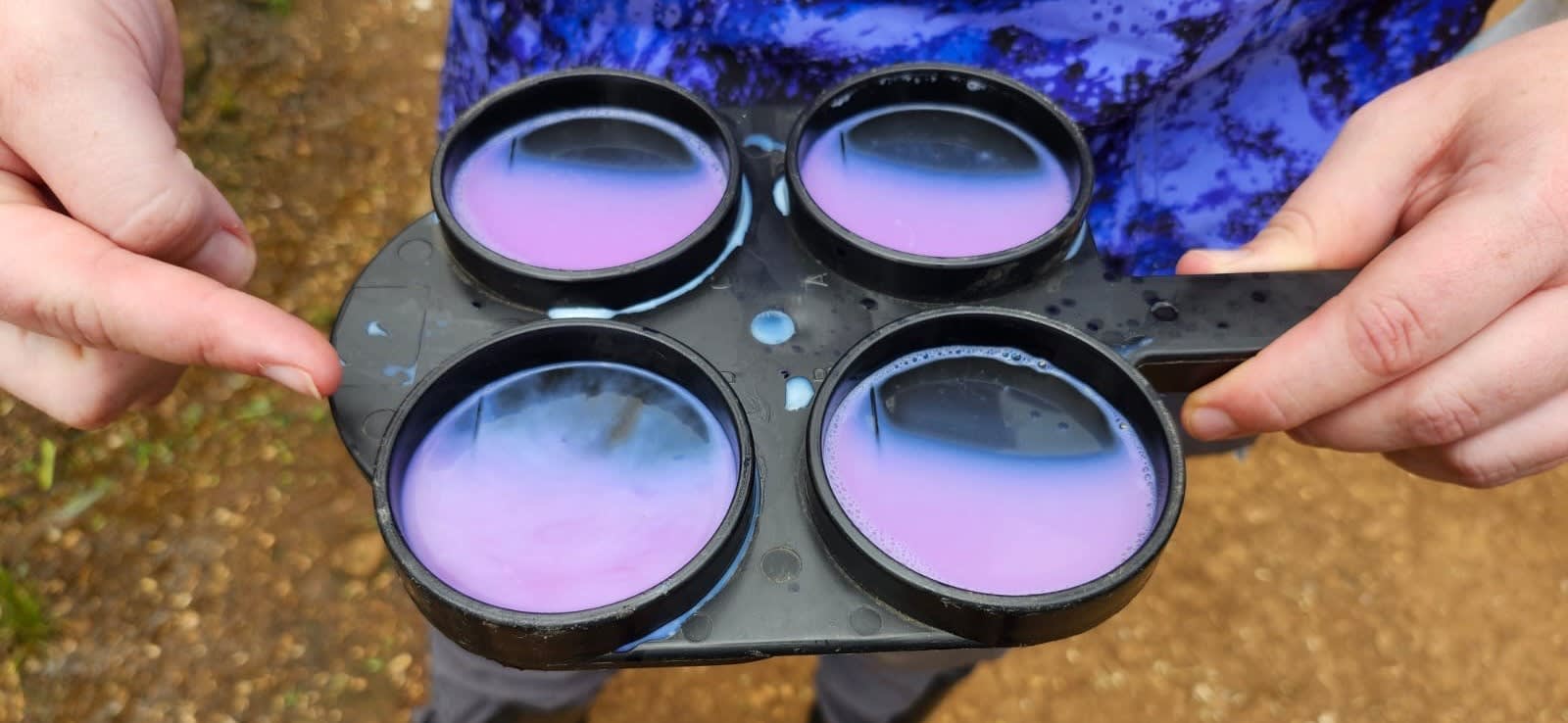
PHOTO: Jaimee demonstrates the CMT, which assesses the Somatic Cell Count in each quarter of a cow's udder.
In fact, mastitis is a topic that Dr. Muller Fotsac has also been addressing. Muller – a veterinarian originally from Cameroon – is currently on a 6-month VETS volunteer placement in Kenya and has been conducting instructional training seminars at the invitation of small dairy societies across Meru County. Focusing on antimicrobial resistance (AMR) as part of the One Health approach, he is helping farmers understand the correlation between diseases such as mastitis, infection prevention and control, and use or misuse of antimicrobials including antibiotics.
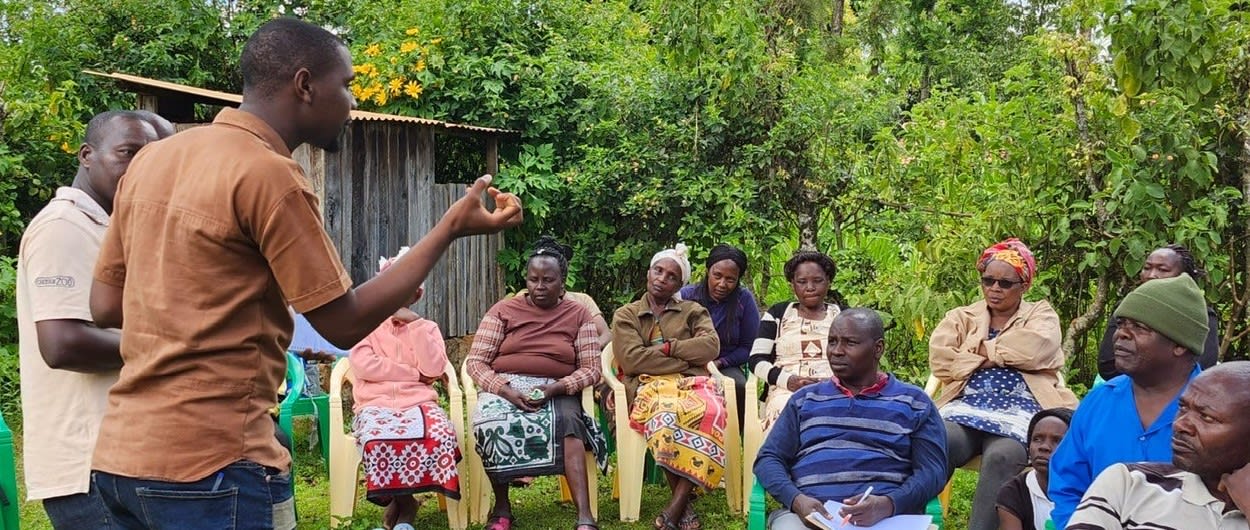
PHOTO: Dr. Muller Fotsac (DVM), a VETS volunteer in Kenya, delivering cow feed and hygiene training to 30 dairy farmers in Matuntukine Village.
Muller says it is important for farmers to understand how good hygiene practices fit into the One Health concept where animal, human and environmental health are all connected. Fortunately, according to Muller, it seems Kenyan farmers are interested in learning more because the number of farmers attending the training sessions has steadily increased: “If one class participates... and they are satisfied, they encourage the other farmers to come for the next training.”
Ultimately, through instructional seminars and hands-on training sessions, VETS volunteers and veterinarians like Jaimee, Rae-Leigh and Muller empower farmers to adopt practices that benefit not only their animals but also human and environmental health. Increased dairy know-how is, in Jaimee's words, "leading to happier, healthier cows which produce high quality milk that can go into the local food supply.”
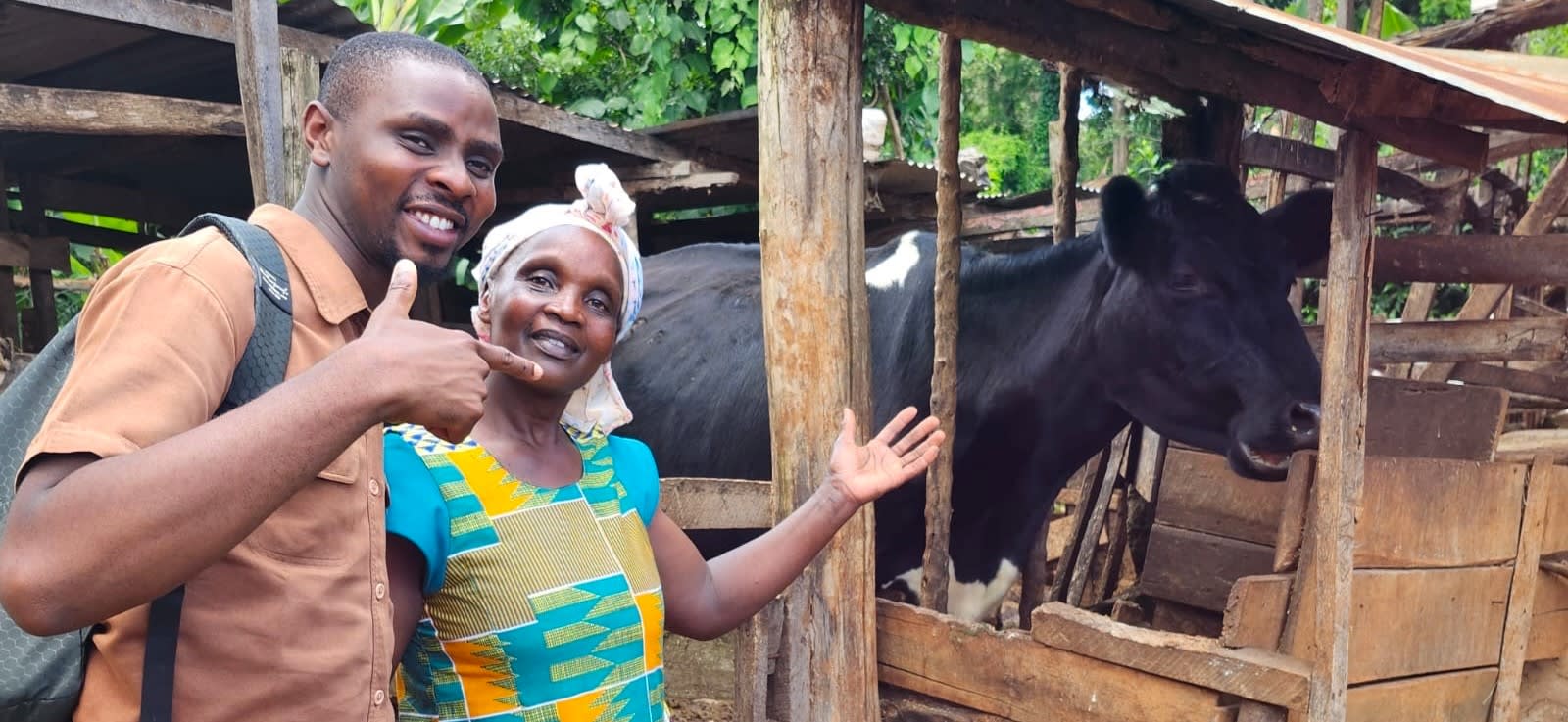
PHOTO: Muller poses with Damari Moses, a dairy farmer who attended his training, at her farm.
The impact of these efforts is evident in the success of farmers like Beth Naito. Grateful for the support she received, Beth has become a role model and inspiration within her community. As a Community One Health Champion, she now volunteers her time to assist other farmers, sharing her expertise and helping them to improve their farms, animal health, and livestock productivity. For Beth, a mother of two, the additional income from her dairy cows has opened doors, allowing her to pay her children's school fees, and most recently, to send them to college and university.
VETS is a 7-year initiative (2020-2027) to improve the economic and social well-being of marginalized people, particularly women and girls, in 6 countries across Africa and Asia. In collaboration with local partners, the program is implemented through 190 Canadian volunteers on international assignment and is generously funded by Global Affairs Canada. Learn more.




